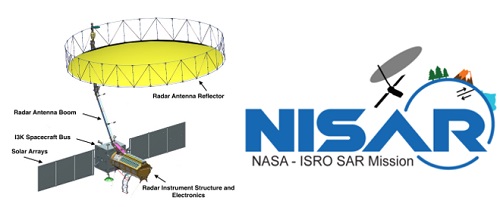- Home
- Prelims
- Mains
- Current Affairs
- Study Materials
- Test Series
01st Aug 2021
WORLD'S FIRST RE-PROGRAMMABLE COMMERCIAL SATELLITE LAUNCHED INTO SPACE ON ARIANE 5 ROCKET
The world’s first commercial fully re-programmable satellite has been launched, ushering in a new era of more flexible communications. Unlike conventional models that are designed and "hard-wired" on Earth and cannot be repurposed once in orbit, the Eutelsat Quantum is based on so-called software-defined technology that allows users to tailor the communications to their needs -- almost in real-time.



- Because it can be reprogrammed while orbiting in a fixed position 35,000km (22,000 miles) above the Earth, the Quantum can respond to changing demands for data transmission and secure communications during its 15-year lifetime.
- The 3.5 tonne Quantum model has eight communications beams, each of which can be modified to change its area of coverage and also the power of the signal it emits.
- Using software made available to the customer, these changes can be made “in a matter of minutes”, according to Eutelsat.
- This means the satellite can be used to provide mobile coverage for moving objects such as aircraft and oceangoing vessels, or coverage after a natural disaster or for one-off events.
- And at a time of growing concern over digital security – as well as the possible weaponising of space – Quantum is able to pinpoint the origin of signals emitted with or without malicious intent and take action to remedy any interference.
- The Quantum will cover a large area from west Africa to Asia.
- The Biotech-PRIDE (Promotion of Research and Innovation through Data Exchange) Guidelines will facilitate this and enable exchange of information to promote research and innovation in different research groups across the country. Singh also launched the website of the Indian Biological Data Centre (IBDC).
- The guidelines are aimed at providing a well-defined framework and guiding principle to facilitate and enable sharing and exchange of biological knowledge, information and data and is specifically applicable to high-throughput, high-volume data generated by research groups across the country, the statement said.
- These guidelines do not deal with generation of biological data but are a mechanism to share and exchange information and knowledge generated according to existing laws, rules, regulations and norms of the country.
- They will ensure data sharing benefits, maximise use, avoid duplication, maximise integration, ownership information, better decision-making and equity of access.
- These guidelines are a mechanism for sharing data publicly and within a reasonable period of time after data-generation. Thus, the utility of the data will be maximum, it said.
- Resultantly, accrual of benefit of public investment for data generation will not be compromised.
- Minister Singh said initially these guidelines will be implemented through the IBDC at the Regional Centre for Biotechnology supported by the Department of Biotechnology (DBT).
- Other existing datasets and data centres will be bridged to this IBDC which will be called bio-grid.
- This bio-grid will be a national repository for biological knowledge, information and data and will be responsible for enabling its exchange, developing measures for safety, standards and quality for datasets and establishing detailed modalities for accessing data.
- The guidelines will be helpful to harmonise, synergise and encourage data sharing for research and analysis in the country and to promote scientific work and foster progress by building on previous work.
- Describing the release of Biotech-PRIDE as the first of its kind by the DBT, the Minister said India's rank is four among the top 20 countries contributing biological databases.
- The government invests a large amount of public funds to generate data in various sectors, including in biosciences for knowledge generation, to gain deep insights into intricate biological mechanisms and other processes and for translation, he added.

- There are plans to launch NISAR (NASA-ISRO Synthetic Aperture Radar) satellite, a joint ISRO-NASA mission early 2023.
- It is aimed for global measurement of land surface changes using advanced radar imaging.
- NISAR is a joint Earth-Observation mission between ISRO and NASA for global observations over all land masses including

- Polar cryosphere and Indian Ocean region.
- It is a dual band (L-band and S-band) Radar imaging mission with capability of full polarimetric and interferometric modes of operation to observe minor changes in land, vegetation and cryosphere.
- NASA is developing L-band SAR and associated systems and ISRO is developing S-band SAR, spacecraft bus, the launch vehicle and associated launch services.
- Objectives of the mission: To improve understanding of the impact of climate change on Earth’s changing Ecosystems, land and coastal processes, land deformations and Cryosphere.
- The amendment bill aims to amend the Airports Economic Regulatory Authority of India Act, 2008.
- The AERA Bill was first introduced in the Lok Sabha in March 2021, but was subsequently referred to a standing committee, which submitted its report on 22 July.
- The report noted that tariffs for smaller airports will be unreasonably high if determined on a standalone basis.
- An enabling provision for AERA to determine tariff for a group of airports is proposed by amending the definition of major airports.
- Under the present Act, a "major airport" has been defined to mean any airport which has annual passengers in excess of 35 lakh.
- However, the Act does not provide for determination of tariff for a group of airports. This would be possible after the amendment.
- The amendment will allow the Airports Economic Regulatory Authority (AERA) to regulate tariff and other charges for aeronautical services.
- This can be done for airports with annual passenger traffic of more than 35 lakh and group of airports too.
- It would help encourage development of smaller airports.
- Once the Bill becomes a law, the government will be able to club profitable and non-profitable airports as a package for privatisation.
- The is done to make non-profitable ones more attractive for investment under the public-private partnership or PPP model.
- With the advent of private players in the airport sector in 2006, there was a risk of monopoly by them.
- To counter this, the Airports Economic Regulatory Authority of India was established in 2008 under the AERA Act 2008.
- Before AERA, the Airports Authority of India — functioning under the civil aviation ministry — was in charge of monitoring services at airports.
- AERA is charged with regulating tariff and other charges for aeronautical services in airports and to also monitor the performance standards of airports.
- Other charges of the body include development and passenger service fee, air traffic management, ground handling services, landing and parking of aircraft.









 Latest News
Latest News
 General Studies
General Studies